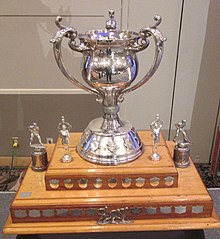
The Western Hockey League (WHL) is a junior ice hockey league based in Western Canada and the Northwestern United States. The WHL is one of three leagues that constitutes the Canadian Hockey League (CHL) as the highest level of junior hockey in Canada, alongside the Ontario Hockey League and Quebec Maritimes Junior Hockey League. Teams play for the Ed Chynoweth Cup, with the winner moving on to play for the Memorial Cup, Canada's national junior championship. WHL teams have won the Memorial Cup 19 times. The WHL is composed of 22 teams divided into two conferences of two divisions. The Eastern Conference comprises 11 teams from Manitoba, Saskatchewan, and Alberta, while the Western Conference comprises eleven teams from British Columbia and the American states of Washington and Oregon.
The Western Canada Senior Hockey League was a senior ice hockey league that played six seasons in Alberta and Saskatchewan, from 1945 to 1951. The league produced the 1946 Allan Cup and the 1948 Allan Cup champions, and merged into the Pacific Coast Hockey League for the 1951–52 season.

The Saskatchewan Junior Hockey League is a Junior 'A' ice hockey league operating in the Canadian province of Saskatchewan and one of nine member leagues of the Canadian Junior Hockey League.
The 1967–68 WCJHL season was the second season of the Western Canada Junior Hockey League (WCJHL). The league adopted its new name after being known as the Canadian Major Junior Hockey League in its inaugural season. The season featured eleven teams, up from seven during the inaugural season, and a 60-game regular season. The Flin Flon Bombers, playing their first season in the league, topped the season standings with 47 wins. In the playoffs, the Bombers faced the Estevan Bruins in the championship series. The Bruins won the series, claiming the President's Cup.
The 1968–69 WCHL season was the third season of the Western Canada Hockey League (WCHL), featuring eight teams and a 60-game regular season. The Flin Flon Bombers topped the season's standings with 47 wins, and in the playoffs defeated the Edmonton Oil Kings to win the club's first President's Cup championship. The Bombers advanced to a national series organized by the Canadian Hockey Association to rival the Memorial Cup. In the series the Bombers defeated the St. Thomas Barons from the Western Ontario Junior A Hockey League.

George Samuel Dudley was a Canadian ice hockey administrator. He joined the Ontario Hockey Association (OHA) executive in 1928, served as its president from 1934 to 1936, and as its treasurer from 1936 to 1960. He was elected to Canadian Amateur Hockey Association (CAHA) executive in 1936, served as its president from 1940 to 1942, as its secretary from 1945 to 1947, and as its secretary-manager from 1947 to 1960. He was secretary of the International Ice Hockey Association from 1945 to 1947, and was later vice-president of the International Ice Hockey Federation (IIHF) from 1957 to 1960. He was expected to become the next president of the IIHF before his death. He graduated from Osgoode Hall Law School in 1917 then practiced law for 43 years as the town solicitor for Midland, Ontario.
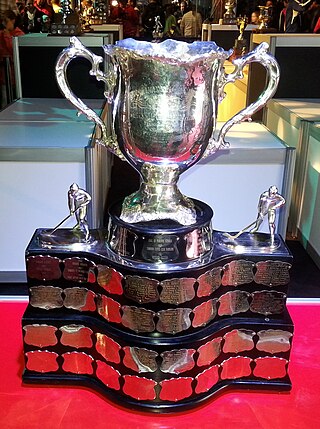
The 1957 Memorial Cup final was the 39th junior ice hockey championship of the Canadian Amateur Hockey Association (CAHA). The Flin Flon Bombers won their first Memorial Cup championship by defeating the Ottawa Junior Canadiens four games to three in a best-of-seven final series held at the Whitney Forum and the Regina Exhibition Stadium. CAHA second vice-president Gordon Juckes oversaw the scheduling and discipline for the national playoffs.

The 1948 Memorial Cup final was the 30th junior ice hockey championship of the Canadian Amateur Hockey Association (CAHA). The George Richardson Memorial Trophy champions Barrie Flyers of the Ontario Hockey Association in Eastern Canada competed against the Abbott Cup champions Port Arthur West End Bruins of the Thunder Bay Junior Hockey League in Western Canada. In a best-of-seven series, held at Maple Leaf Gardens in Toronto, Ontario, Port Arthur won their 1st Memorial Cup, defeating Barrie 4 games to 0.

Allan Wilfrid Pickard was a Canadian ice hockey administrator, who served as president of the Canadian Amateur Hockey Association (CAHA) from 1947 to 1950. When Canada opted out of the 1947 Ice Hockey World Championships and decided not to participate in the 1948 Winter Olympics, Pickard felt that Canada was obliged to send a team due to its place as a top hockey nation, and nominated the Ottawa RCAF Flyers who won the gold medal for Canada and lived up to the requirements of the Olympic Oath as amateurs. Despite disagreement with the International Olympic Committee, he sought for the International Ice Hockey Federation to adopt the CAHA definition of amateur in the face of increasing difficulty in selecting the Canada men's national ice hockey team.
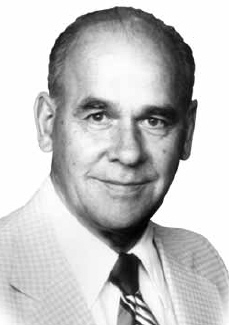
Frederick Page was a Canadian ice hockey administrator and ice hockey referee. He originated from Port Arthur, Ontario, where he played junior ice hockey, refereed locally and later at the Memorial Cup and Allan Cup competitions. He was a league executive in Fort William, then served as president of the Thunder Bay Amateur Hockey Association from 1958 to 1962. He was elected second vice president of the Canadian Amateur Hockey Association (CAHA) in 1962, and rose up the ranks to be its president from 1966 to 1968. Page wanted the CAHA to gain more control over its affairs, and become less dependent on the National Hockey League (NHL). Under his leadership, the NHL ended direct sponsorship of junior hockey teams. He was instrumental in negotiating the revised agreement for the NHL Amateur Draft in 1967, and later served as co-chairman of the resulting joint player development committee.
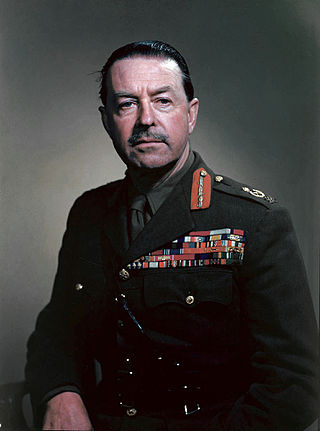
The Alexander Cup was the championship trophy for the Major Series of senior ice hockey in the Canadian Amateur Hockey Association from 1950 to 1954. The trophy was presented by its namesake, the Viscount Alexander as the 17th Governor General of Canada.

William George Hardy was a Canadian professor, writer, and ice hockey administrator. He lectured on the Classics at the University of Alberta from 1922 to 1964, and served as president of the Canadian Authors Association. He was an administrator of Canadian and international ice hockey, and served as president of the Alberta Amateur Hockey Association, the Canadian Amateur Hockey Association (CAHA), the International Ice Hockey Association, and the International Ice Hockey Federation.

Lloyd Thompson Pollock was a Canadian ice hockey administrator and businessman. After running the Windsor City Hockey League, he assisted in the foundation of the Windsor Softball League, and later started a junior ice hockey league in Windsor, Ontario. He was a cofounder of the International Hockey League in 1945, and founder of the original Windsor Spitfires junior team in 1946. He served as president of the Ontario Hockey Association (OHA) from 1961 to 1963, welcomed the Montreal Junior Canadiens into the OHA when it was divided by the Metro Junior A League, and supported measures to preserve the Northern Ontario Hockey Association.
The Canadian Hockey Association (CHA) was a junior ice hockey governing body in Canada from 1968 to 1970. It was formed when the Western Canada Hockey League (WCHL) broke away from the Canadian Amateur Hockey Association (CAHA), due to disagreements with the CAHA and the National Hockey League (NHL) establishing the NHL Amateur Draft in 1967. Ron Butlin became president of both the CHA and the WCHL with the objective of the getting a better financial deal for teams in Western Canada which had greater expenses than teams in Eastern Canada, and to fight the age limit on players imposed by the NHL. Butlin was also opposed to the CAHA structure of elected officials who determined hockey policy, rather than representation by team owners and operators of hockey businesses. The CHA added the Western Ontario Junior Hockey League (WOJHL) to its ranks in opposition to how hockey was controlled. The WOJHL was denied the financially desirable junior hockey A-level status by the Ontario Hockey Association despite being based in the industrialized Southwestern Ontario region, and was discontent with losing its best players annually to other leagues in Ontario.
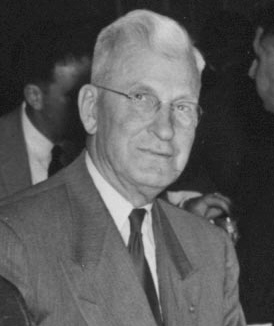
John Welch Hamilton was a Canadian sports executive. He served as president of the Canadian Amateur Hockey Association (CAHA) from 1930 to 1932, president of the Amateur Athletic Union of Canada from 1936 to 1938, and was a member of the Canadian Olympic Committee for 17 years. His leadership of the CAHA and the AAU of C coincided with efforts to maintain amateurism and combat growing professionalism in sport. He appointed a committee to establish better relations between the CAHA and professional leagues, and praised the players and teams for quality hockey and growth of the amateur game in Canada despite the competition. He favoured professionals in one sport playing as amateurs in another, and took charge of the AAU of C at a time when the CAHA, the Canadian Amateur Basketball Association, and the Canadian Amateur Lacrosse Association challenged the definition of amateur, and later broke away from the AAU of C which wanted to hold onto purist ideals of amateurism.

Frank Ernest Sandercock was a Canadian ice hockey administrator. He served as president of both the Canadian Amateur Hockey Association and the Alberta Amateur Hockey Association, and had previously been an executive with the Ontario Hockey Association and founded a hockey organization to operate leagues in Calgary. He was an early proponent of junior ice hockey and senior ice hockey in Alberta, fostered growth in the game, and sought to reinvest profits into minor ice hockey for the younger generation.
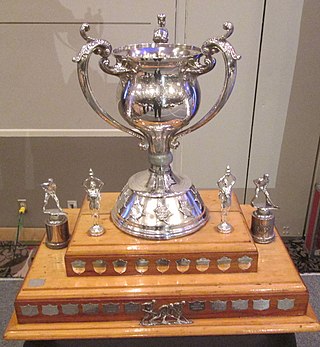
The Saskatchewan Junior Hockey League was a junior ice hockey based in Saskatchewan and Manitoba from 1948 until 1966. It operated under the jurisdiction of the Saskatchewan Amateur Hockey Association. Two of its teams won the Abbott Cup as the junior champions of Western Canada, and the Flin Flon Bombers won the Memorial Cup as the national junior champion of Canada in 1957. Frank Boucher served as commissioner of the league from 1959 to 1966. The league disbanded when five of its eight teams joined the newly formed Canadian Major Junior Hockey League.
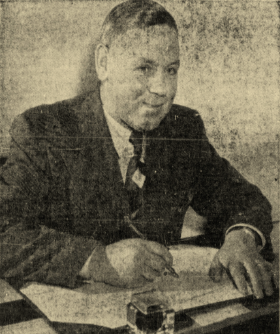
Douglas George Grimston was a Canadian ice hockey administrator who served as president of the Canadian Amateur Hockey Association (CAHA) from 1950 to 1952. He oversaw the establishment of the Major Series for the Alexander Cup and implemented a new deal for player contracts in senior ice hockey, in response to the Allan Cup championship being dominated by a small group of teams who sought to protect themselves from professional leagues recruiting their players. He opposed the National Hockey League wanting its junior ice hockey prospect players on stronger teams, which led to limits on the transfer of players to keep balanced competition for the Memorial Cup. After the 1952 Winter Olympics where the Canada men's national ice hockey team won the gold medal, Grimston recommended withdrawal from Olympic hockey since European nations would never agree to ice hockey rules which allowed physical play. Grimston later accused International Ice Hockey Federation vice-president Bunny Ahearne of financially exploiting of the Edmonton Mercurys on a European tour, which led to a physical altercation between them.
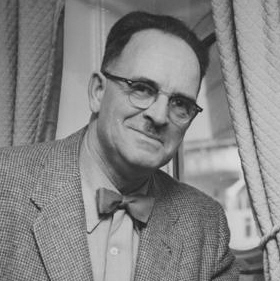
William Bryden George, also known as Baldy George, was a Canadian sports administrator and agriculturalist. He was president of the Canadian Amateur Hockey Association from 1952 to 1955, when Canada debated whether it would withdraw from the Ice Hockey World Championships and the Olympic Games. At issue was the perceived financial exploitation of the Canada men's national ice hockey team and abuse from European media on the Canadian style of physical play. He wanted a financial guarantee for the national team when it travelled since its participation increased attendance at events in Europe. Canada did not participate at the World Championships in 1953 and placed second in 1954, which led to heavy criticism by media in Canada for the failure to win. Although Canada won the 1955 Ice Hockey World Championships, George questioned future participation and was concerned that the game in Europe took on political and religious meanings in which Canada did not want to become involved.
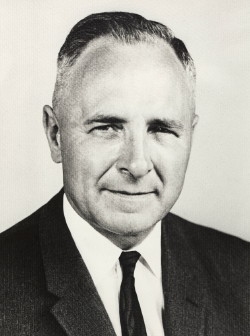
Arthur Thomas Potter was a Canadian ice hockey administrator. He was president of the Canadian Amateur Hockey Association (CAHA) from 1962 to 1964, and oversaw the establishment of a permanent Canada men's national ice hockey team after he decided that sending the reigning Allan Cup champion to international competitions was no longer the answer. He felt that Canada needed discipline to handle Cold War tactics and propaganda at the Ice Hockey World Championships, sought to give its best players to develop as a team, and supported a plan by Father David Bauer to assemble a team of amateur student athletes to complete at the 1964 Winter Olympics.
